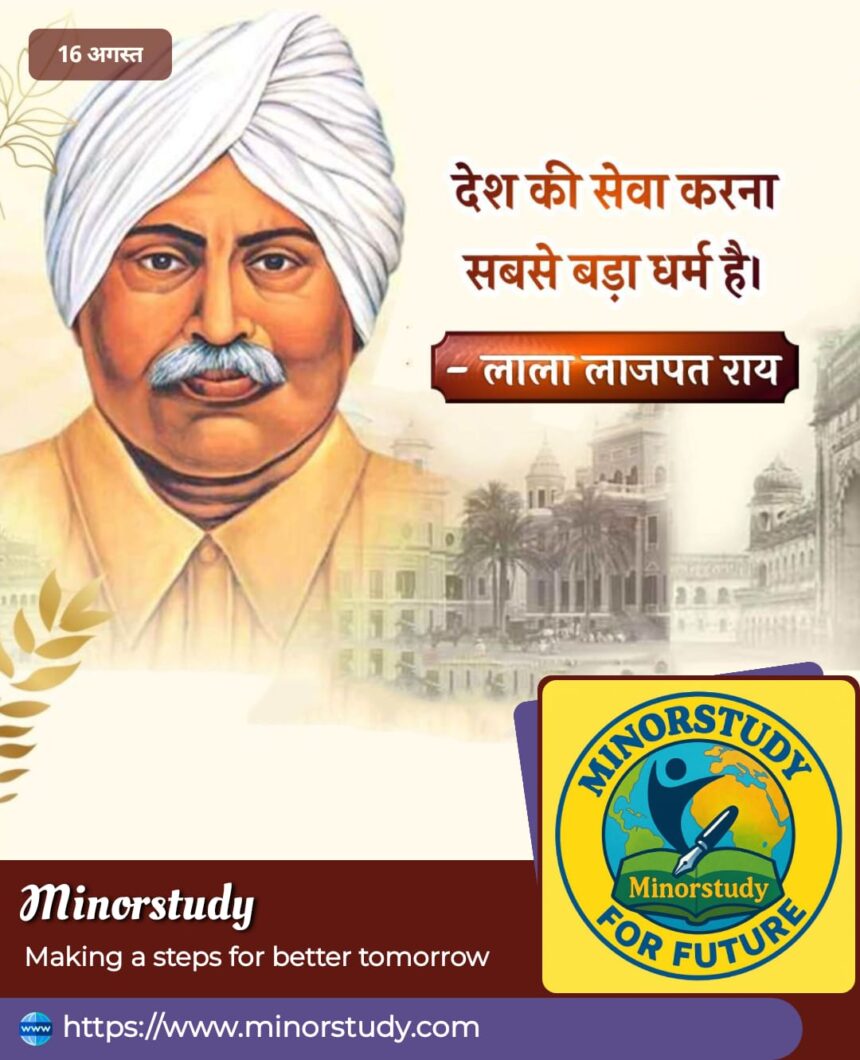6 Inspiring Lessons From Lala Lajpat Rai About Serving the Nation
Lala Lajpat Rai, famously known as “Punjab Kesari”, was a visionary leader, social reformer, and one of the foremost freedom fighters of India. His quote, “Serving the country is the greatest religion,” captures the essence of his belief that dedication, duty, and selfless service to the nation transcend personal interests, religious boundaries, and social divisions.
- History and Background of Lala Lajpat Rai
- Timeline of Lala Lajpat Rai’s Life
- Key Facts About Lala Lajpat Rai
- Significance of the Quote
- 6 Lessons From Lala Lajpat Rai’s Life
- 1. Selfless Service is Sacred
- 2. Courage in the Face of Adversity
- 3. Education Empowers Citizens
- 4. Unity Strengthens the Nation
- 5. Lead by Example
- 6. Sacrifice for Greater Good
- FAQs About Lala Lajpat Rai
- Daily Life Lessons From Lala Lajpat Rai
- Societal and Cultural Impact
- Wishing and Celebrating Lala Lajpat Rai
- Important Points to Remember
- Conclusion: Lala Lajpat Rai’s Enduring Legacy
This article explores Lala Lajpat Rai’s life, achievements, historical timeline, key facts, the significance of his quote, societal impact, and practical lessons for daily life, written in a human-friendly style.
History and Background of Lala Lajpat Rai
Born on 28 January 1865 in Dhudike, Punjab, Lala Lajpat Rai emerged as a dynamic leader during the Indian freedom struggle. Educated in Lahore, he was a lawyer, writer, and social activist who advocated for education, self-reliance, and national unity.
He became a prominent figure in the Indian National Congress, collaborating with other leaders to inspire political awakening and social reforms. Lajpat Rai’s work was not limited to politics; he also focused on educational institutions, public health, and the upliftment of society.
Timeline of Lala Lajpat Rai’s Life
1865: Born in Dhudike, Punjab.
1880s: Completed education in Lahore and started career as a lawyer.
1892: Became actively involved in the Indian National Congress.
1905: Opposed the Partition of Bengal, leading mass protests.
1928: Led the protest against the Simon Commission, suffering severe injuries during a police lathi-charge.
17 November 1928: Passed away due to complications from injuries sustained in the protest, becoming a martyr for India’s freedom struggle.
Key Facts About Lala Lajpat Rai
Known as “Punjab Kesari” (Lion of Punjab) for his bravery and leadership.
Advocated selfless service, patriotism, and national education.
Contributed to founding educational institutions, including Punjab National Bank and Dayanand Anglo-Vedic College.
Believed in uniting Indians across religion, caste, and region for national progress.
Emphasized that serving the nation is a sacred duty, higher than any personal or religious obligation.
Significance of the Quote
“Serving the country is the greatest religion.”
This quote carries deep significance:
Patriotism as Duty: True patriotism transcends rituals and personal gain, rooted in active service and contribution to the nation.
Universal Message: Regardless of religion, caste, or background, serving society is the highest form of devotion.
Inspiration for Action: It motivates citizens to prioritize collective welfare and national progress over individual interests.
Timeless Relevance: This principle remains applicable in modern governance, community service, and civic responsibility.
6 Lessons From Lala Lajpat Rai’s Life
1. Selfless Service is Sacred
Lajpat Rai taught that working for the nation is the noblest form of devotion, reflecting moral courage and dedication.
2. Courage in the Face of Adversity
He faced police brutality and political oppression without losing faith in his cause, demonstrating that true service requires bravery.
3. Education Empowers Citizens
He strongly believed that educated and aware citizens are better equipped to serve society effectively.
4. Unity Strengthens the Nation
By advocating cooperation across religions and regions, Lajpat Rai showed that national progress depends on collective effort.
5. Lead by Example
He personally participated in protests and public initiatives, inspiring others to serve without expecting rewards.
6. Sacrifice for Greater Good
His life demonstrates that personal sacrifices are sometimes necessary to uphold justice, freedom, and societal well-being.
FAQs About Lala Lajpat Rai
Q1: Who was Lala Lajpat Rai?
A: He was a freedom fighter, social reformer, and leader of the Indian National Congress, widely known as Punjab Kesari.
Q2: What does his quote mean?
A: It emphasizes that serving the nation is the highest form of duty and devotion, surpassing religious or personal interests.
Q3: Why is he significant in Indian history?
A: He inspired citizens to participate actively in the freedom struggle, social reform, and nation-building, leaving a lasting legacy.
Q4: How did he serve the nation?
A: Through political activism, educational initiatives, social reforms, and leading protests against colonial rule.
Q5: What lessons can modern readers learn?
A: Bravery, selfless service, education, unity, leadership, and moral courage are key principles applicable in daily life.
Daily Life Lessons From Lala Lajpat Rai
Serve Society First: Prioritize actions that benefit your community and nation.
Show Courage: Face challenges and injustice with determination and resilience.
Value Education: Knowledge equips you to make meaningful contributions.
Promote Unity: Work to bridge social, religious, and regional divides.
Lead by Example: Inspire others by actively participating in service initiatives.
Sacrifice for Justice: Be ready to put collective welfare above personal gain.
Societal and Cultural Impact
Lala Lajpat Rai’s teachings continue to inspire political leaders, social activists, and citizens.
His principle that serving the nation is a sacred duty fosters civic responsibility and patriotism.
Educational institutions, awards, and public programs honor his contributions, keeping the spirit of selfless service alive.
His life underscores the importance of unity, courage, and active citizenship for societal progress.
Wishing and Celebrating Lala Lajpat Rai
“May the bravery, dedication, and selfless service of Lala Lajpat Rai inspire you to serve your nation with courage and commitment.”
“Let his life remind us that true devotion is reflected in actions that uplift society and uphold justice.”
National celebrations, educational initiatives, and civic programs often commemorate his contributions, encouraging people to embrace service as a sacred duty.
Important Points to Remember
Serving the nation is a sacred duty transcending religion and personal interests.
Courage, education, and moral integrity are central to meaningful service.
Lala Lajpat Rai’s life teaches sacrifice, unity, leadership, and dedication.
Citizens who embrace these values strengthen society, democracy, and national identity.
His legacy continues to inspire patriotism, ethical leadership, and active citizenship.
Conclusion: Lala Lajpat Rai’s Enduring Legacy
Lala Lajpat Rai’s life reminds us that true devotion is expressed through selfless service, courage, and dedication to the nation. His quote, “Serving the country is the greatest religion,” emphasizes that patriotism is not just an emotion but a responsibility that guides our actions, decisions, and contributions.
By embracing his teachings, individuals can build stronger communities, foster national unity, and inspire future generations. Lajpat Rai’s legacy continues to shine as a beacon of bravery, service, and moral leadership, urging citizens to live by the principle that serving the nation is the highest form of duty.








